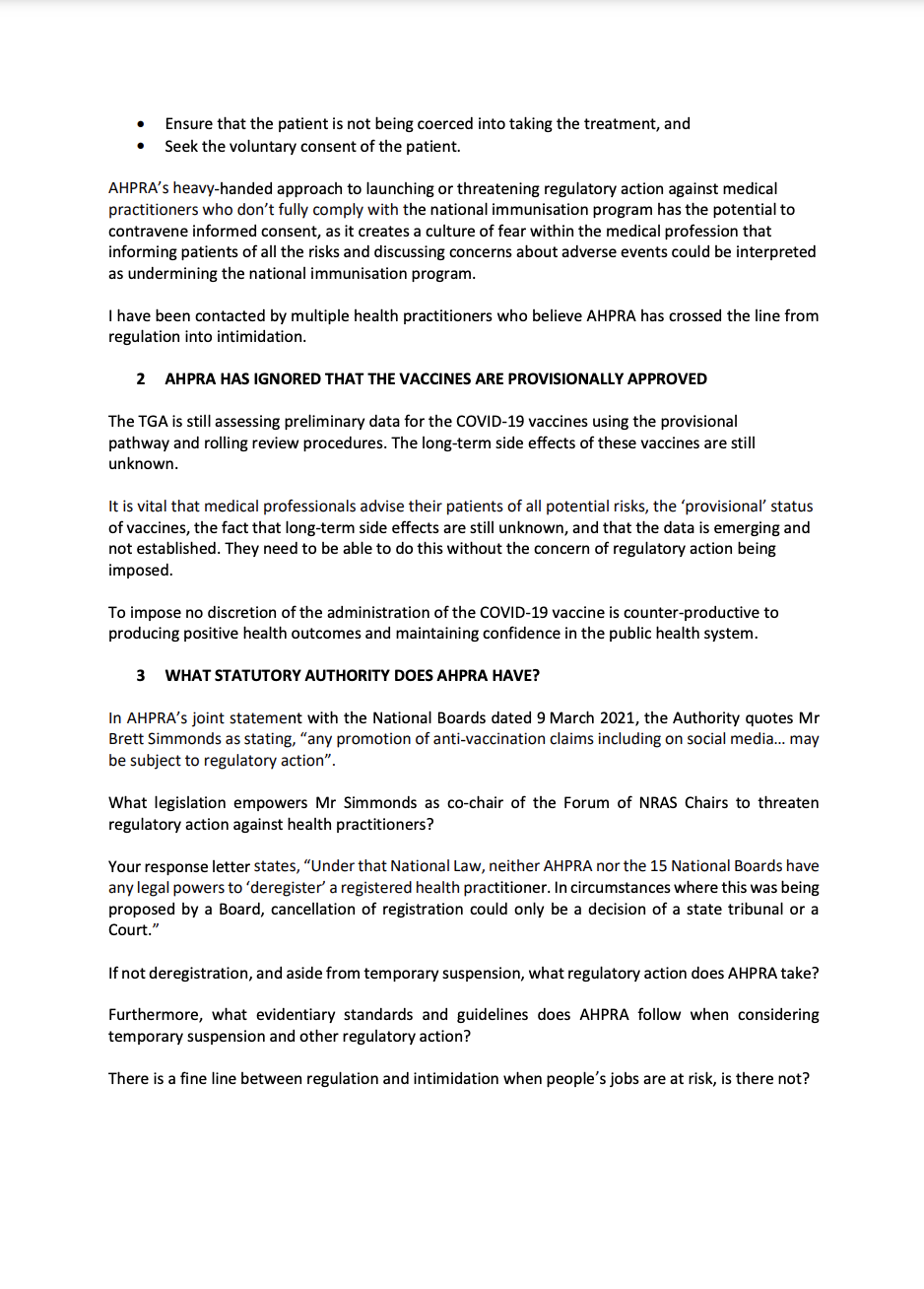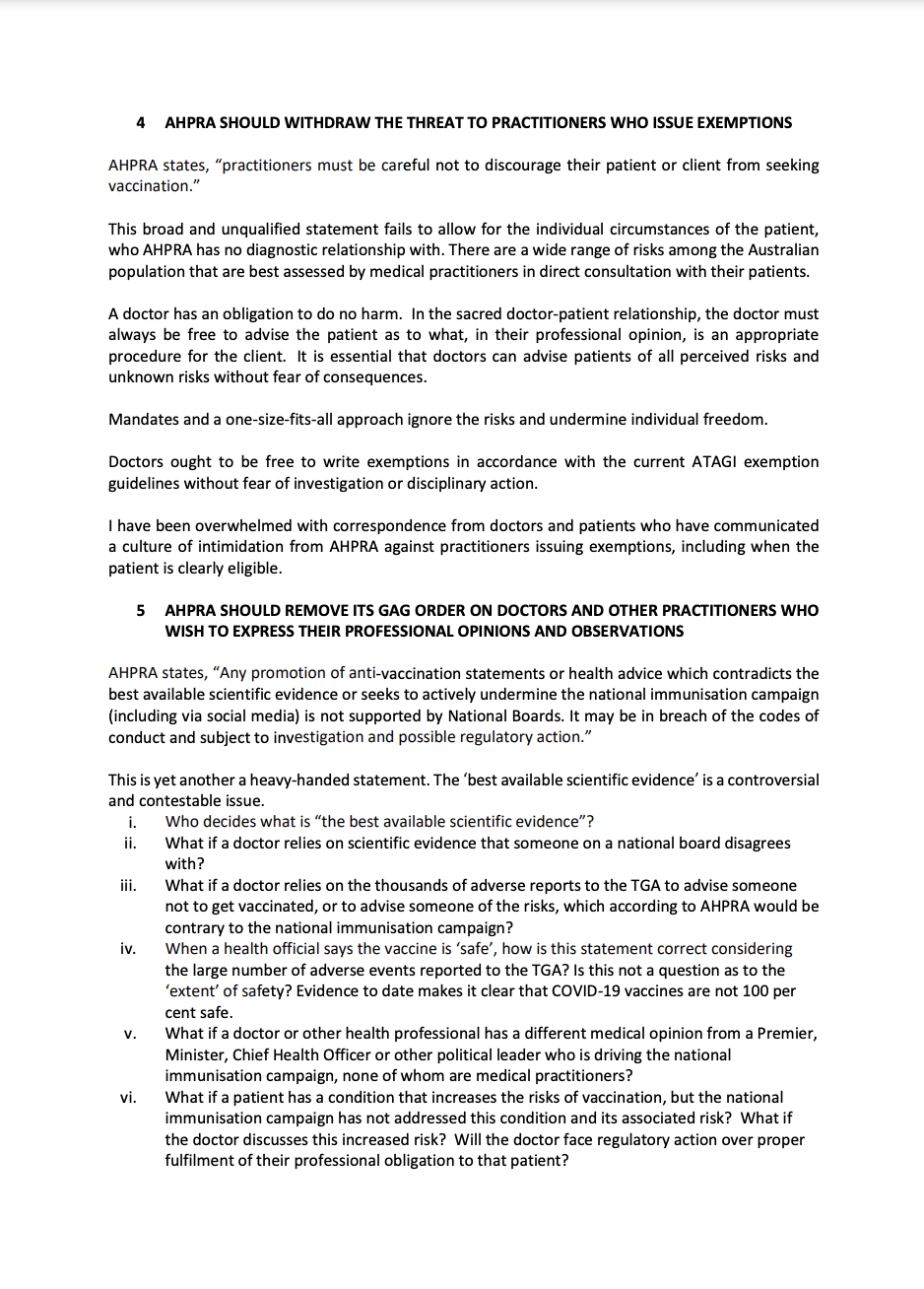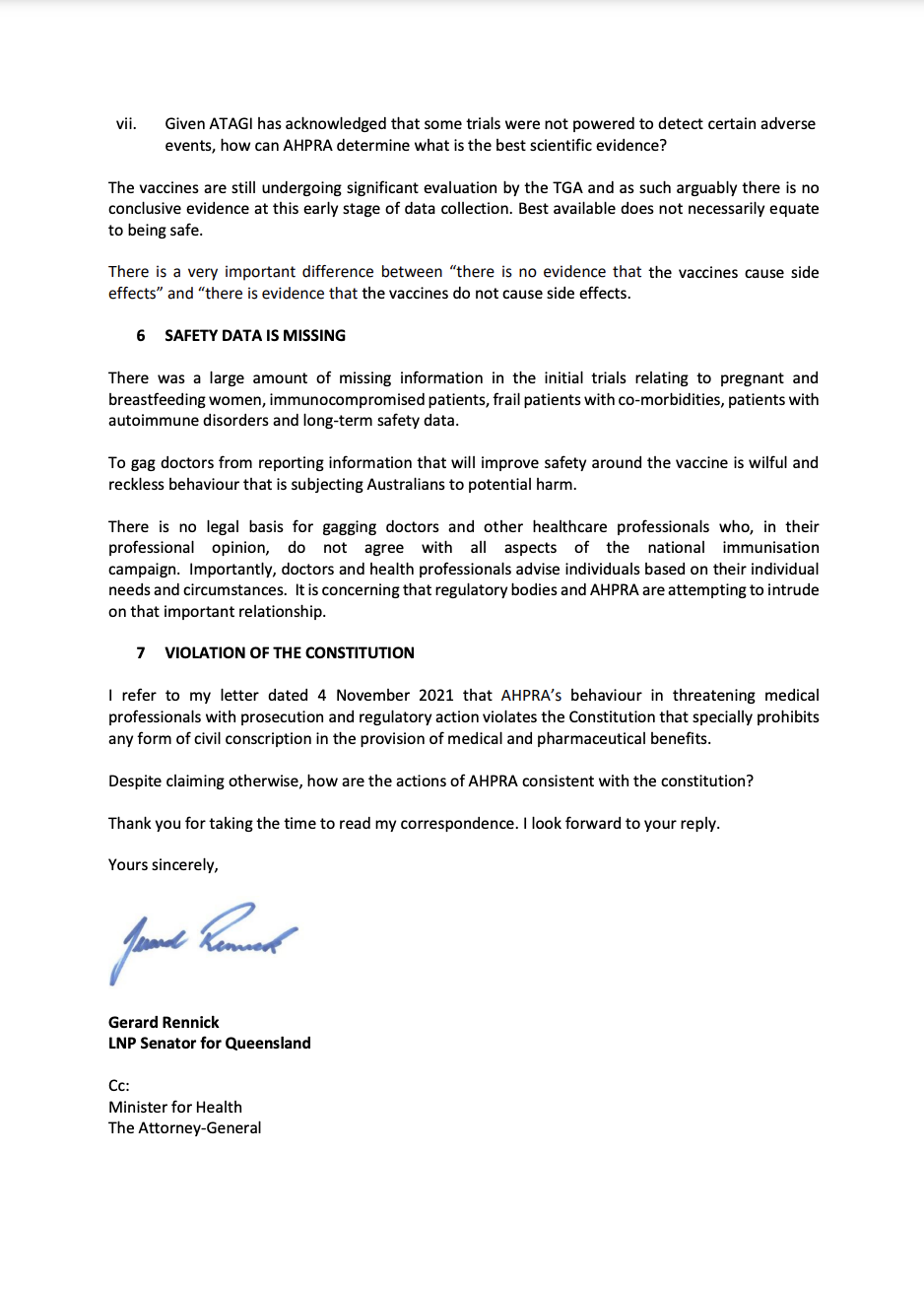Mr Martin Fletcher
CEO, AHPRA
GPO Box 9958
MELBOURNE VIC 3001
Via email: martin.fletcher@ahpra.gov.au
23 December 2021
Dear Mr Fletcher,
Thank you for your letter of response to my initial query dated 4 November 2021 and published on your website on 23 November 2021.
I ask that AHPRA provide a response to the following points for the good of the Australian public.
1. AHPRA IS UNDERMINING INFORMED CONSENT
It is deeply concerning that AHPRA and the National Boards are seemingly forcing doctors, nurses, and other health professionals to breach the principle of ‘informed consent’.
While AHPRA is no doubt aware of what informed consent means, its actions speak otherwise.
The Australian Commission on Safety and Quality in Health Care states that for there to be valid
informed consent, the person consenting must:
• Have the legal capacity to consent
• Give their consent voluntarily
• Give their consent to the specific treatment, procedure or other intervention being discussed
• Have enough information about their condition, treatment options, the benefits and risks
relevant to them, and alternative options for them to make an informed decision to consent. This includes the opportunity to ask questions and discuss concerns.
With respect to COVID-19 vaccines, informed consent ensures that medical professionals fulfil their
obligations to:
• Advise their patient of all potential and contested risks (for example, where adverse events have been reported and the authorities have decided that the administration of a vaccine could not possibly be related),
• Advise their patient of unknown risks and known benefits,
• Advise their patient that these vaccines have ‘provisional approval’ only (because, as the TGA states, long-term side effects are unknown),
• Advise their patient that it is well known that not all adverse events will not be recorded when such reporting is voluntary,
• Ensure that the patient is not being coerced into taking the treatment, and
• Seek the voluntary consent of the patient.
AHPRA’s heavy-handed approach to launching or threatening regulatory action against medical practitioners who don’t fully comply with the national immunisation program has the potential to contravene informed consent, as it creates a culture of fear within the medical profession that informing patients of all the risks and discussing concerns about adverse events could be interpreted as undermining the national immunisation program.
I have been contacted by multiple health practitioners who believe AHPRA has crossed the line from regulation into intimidation.
2. AHPRA HAS IGNORED THAT THE VACCINES ARE PROVISIONALLY APPROVED
The TGA is still assessing preliminary data for the COVID-19 vaccines using the provisional pathway and rolling review procedures. The long-term side effects of these vaccines are still unknown.
It is vital that medical professionals advise their patients of all potential risks, the ‘provisional’ status of vaccines, the fact that long-term side effects are still unknown, and that the data is emerging and not established. They need to be able to do this without the concern of regulatory action being imposed.
To impose no discretion of the administration of the COVID-19 vaccine is counter-productive to
producing positive health outcomes and maintaining confidence in the public health system.
3. WHAT STATUTORY AUTHORITY DOES AHPRA HAVE?
In AHPRA’s joint statement with the National Boards dated 9 March 2021, the Authority quotes Mr Brett Simmonds as stating, “any promotion of anti-vaccination claims including on social media… may be subject to regulatory action”.
What legislation empowers Mr Simmonds as co-chair of the Forum of NRAS Chairs to threaten regulatory action against health practitioners?
Your response letter states, “Under that National Law, neither AHPRA nor the 15 National Boards have any legal powers to ‘deregister’ a registered health practitioner. In circumstances where this was being proposed by a Board, cancellation of registration could only be a decision of a state tribunal or a Court.”
If not deregistration, and aside from temporary suspension, what regulatory action does AHPRA take?
Furthermore, what evidentiary standards and guidelines does AHPRA follow when considering temporary suspension and other regulatory action?
There is a fine line between regulation and intimidation when people’s jobs are at risk, is there not?
4. AHPRA SHOULD WITHDRAW THE THREAT TO PRACTITIONERS WHO ISSUE EXEMPTIONS
AHPRA states, “practitioners must be careful not to discourage their patient or client from seeking vaccination.”
This broad and unqualified statement fails to allow for the individual circumstances of the patient, who AHPRA has no diagnostic relationship with. There are a wide range of risks among the Australian population that are best assessed by medical practitioners in direct consultation with their patients.
A doctor has an obligation to do no harm. In the sacred doctor-patient relationship, the doctor must always be free to advise the patient as to what, in their professional opinion, is an appropriate procedure for the client. It is essential that doctors can advise patients of all perceived risks and unknown risks without fear of consequences.
Mandates and a one-size-fits-all approach ignore the risks and undermine individual freedom.
Doctors ought to be free to write exemptions in accordance with the current ATAGI exemption guidelines without fear of investigation or disciplinary action.
I have been overwhelmed with correspondence from doctors and patients who have communicated a culture of intimidation from AHPRA against practitioners issuing exemptions, including when the patient is clearly eligible.
5. AHPRA SHOULD REMOVE ITS GAG ORDER ON DOCTORS AND OTHER PRACTITIONERS WHO
WISH TO EXPRESS THEIR PROFESSIONAL OPINIONS AND OBSERVATIONS
AHPRA states, “Any promotion of anti-vaccination statements or health advice which contradicts the best available scientific evidence or seeks to actively undermine the national immunisation campaign (including via social media) is not supported by National Boards. It may be in breach of the codes of conduct and subject to investigation and possible regulatory action.”
This is yet another a heavy-handed statement. The ‘best available scientific evidence’ is a controversial and contestable issue.
i. Who decides what is “the best available scientific evidence”?
ii. What if a doctor relies on scientific evidence that someone on a national board disagrees with?
iii. What if a doctor relies on the thousands of adverse reports to the TGA to advise someone not to get vaccinated, or to advise someone of the risks, which according to AHPRA would be contrary to the national immunisation campaign?
iv. When a health official says the vaccine is ‘safe’, how is this statement correct considering the large number of adverse events reported to the TGA? Is this not a question as to the ‘extent’ of safety? Evidence to date makes it clear that COVID-19 vaccines are not 100 percent safe.
v. What if a doctor or other health professional has a different medical opinion from a Premier, Minister, Chief Health Officer or other political leader who is driving the national immunisation campaign, none of whom are medical practitioners?
vi. What if a patient has a condition that increases the risks of vaccination, but the national immunisation campaign has not addressed this condition and its associated risk? What if the doctor discusses this increased risk? Will the doctor face regulatory action over proper fulfilment of their professional obligation to that patient?
vii. Given ATAGI has acknowledged that some trials were not powered to detect certain adverse events, how can AHPRA determine what is the best scientific evidence?
The vaccines are still undergoing significant evaluation by the TGA and as such arguably there is no conclusive evidence at this early stage of data collection. Best available does not necessarily equate to being safe.
There is a very important difference between “there is no evidence that the vaccines cause side effects” and “there is evidence that the vaccines do not cause side effects.
6. SAFETY DATA IS MISSING
There was a large amount of missing information in the initial trials relating to pregnant and breastfeeding women, immunocompromised patients, frail patients with co-morbidities, patients with autoimmune disorders and long-term safety data.
To gag doctors from reporting information that will improve safety around the vaccine is wilful and reckless behaviour that is subjecting Australians to potential harm.
There is no legal basis for gagging doctors and other healthcare professionals who, in their professional opinion, do not agree with all aspects of the national immunisation campaign. Importantly, doctors and health professionals advise individuals based on their individual needs and circumstances. It is concerning that regulatory bodies and AHPRA are attempting to intrude on that important relationship.
7. VIOLATION OF THE CONSTITUTION
I refer to my letter dated 4 November 2021 that AHPRA’s behaviour in threatening medical professionals with prosecution and regulatory action violates the Constitution that specially prohibits any form of civil conscription in the provision of medical and pharmaceutical benefits.
Despite claiming otherwise, how are the actions of AHPRA consistent with the constitution?
Thank you for taking the time to read my correspondence. I look forward to your reply.
Yours sincerely,
Gerard Rennick
LNP Senator for Queensland
Cc:
Minister for Health
The Attorney-General
Download the letter here.


































